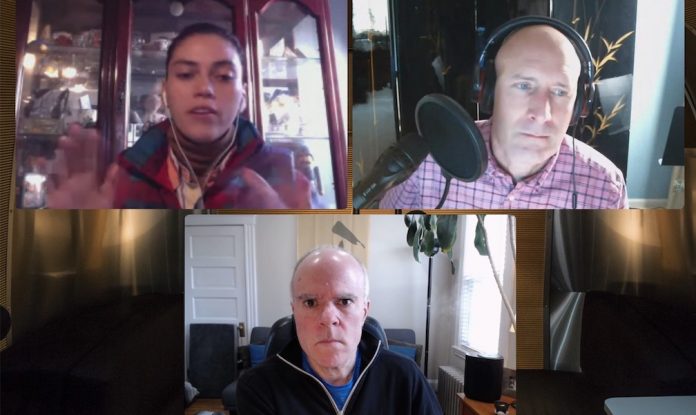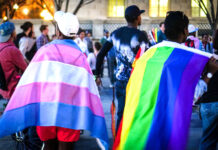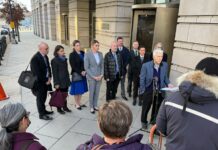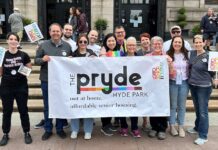[This column appears in the March/April 2021 issue of Boston Spirit magazine. Subscribe for free today.]
StoryCorps is a beloved organization that began in a recording booth set up in Grand Central Terminal in 2003. Their mission is to preserve and share humanity’s stories in order to build connections between people and create a more just and compassionate world. They achieve this by inviting two people at a time to have a conversation about anything they choose that feels important to them. The interviews are all recorded and archived in the Library of Congress. Some of the 40-minute conversations are edited down to a 3-minute piece, which is aired on radio networks like National Public Radio. Traditionally, these interviews were conducted in recording booths that were placed in different locations. In 2005, StoryCorps converted an Airstream trailer into a traveling recording studio and they launched their first Mobile Tour. This enabled them to collect stories from people and communities that are often missed or overlooked.
StoryCorps selected Boston as the first stop in their 2021 Mobile Tour, sponsored by WBUR, and they reached out to The LGBT Aging Project at Fenway Health to be a community partner. Other community partners for the Boston tour included Speak Out, The Food Project, Crossroads and Victory Programs. The LGBT Aging Project took on the mission to collect important voices that reflect the scope and diversity of our older adult LGBT Community and the achievements these folks made in Boston’s history.
Given the restrictions of COVID-19 the traveling recording studio was replaced by a virtual recording platform that allowed each pair to record their conversations from the safety and comfort of their own homes.
The LGBT Aging Project gathered two dozen people to share their stories. Many of those were connected to Fenway Health and others were from the larger Boston LGBTQ senior community.
Many of the stories reflected critical moments in Boston’s history; one such story came from one of the early leaders in the AIDS crisis, Dr. Ken Mayer, who spoke with Fenway’s new CEO Ellen LaPointe. The two worked together over 30 years ago at the beginning of the AIDS epidemic in Providence. Mayer and LaPointe spoke about those painful times when so many lives were lost. And now, decades later, their paths have come together again at Fenway in the midst of another global health crisis.
Another poignant story was shared by Brad Greggory and Fenway’s Dr. Elizabeth Kass who worked together at the Hospice at Mission Hill from 1989 to 1997 during the height of the AIDS crisis. They also reflected the echo of those memories with the current COVID19 pandemic.
Author and lifelong activist Sue Katz spoke with her friend Bren Cole from Fenway’s Communication Department. The two, who are nearly 40 years apart in age, spoke about the joy of intergenerational connections and the shared experiences they both had as butch lesbians escaping their small towns to find community in Boston.
Another intergenerational conversation was shared between Kelvin Powell and Donnell Graves. Powell spoke about his experiences growing up gay and Black in southern Mississippi and moving to Boston to work with Fenway’s Biomedical Research towards an AIDS vaccine. The two also spoke about the importance of the LGBT Elders of Color group where they both met.
Dale Mitchell and David Aronstein recounted the events that led up to Boston’s first summit on LGBT aging back in 2001 and how that meeting led to the creation of The LGBT Aging Project that both men cofounded. Mitchell and Aronstein were amused in their recollections because when they started this work they were in their late forties and now they find themselves part of the community of LGBT elders that they were once advocating for.
The LGBT Aging Project’s director, Lisa Krinsky, spoke with another legendary activist, Claire Barden, about her work with the first chapter of Daughters of Bilitis in Boston. This was one of the first groups formed for lesbians in the city’s history. Barden also spoke about losing her longtime partner of 57 years in the middle of COVID.
I too had the pleasure of recording a session with a man who I have not seen or spoken to in 40 years. Christopher Zitney was one of my closest friends when we were in high school back in Maine in the early 1980s. We were we both silently struggling with our sexual identity but didn’t dare tell the other person; a matter only complicated by the fact that I was deeply in love with him. We reconnected by chance, only a few weeks before the StoryCorps project and used that as an opportunity to reflect on the challenges and fears we faced in coming out in the ’80s. I was also able to speak publicly for the first time about a painful incident back then that led me to the work that I do today with LGBTQ elders.
Community member Haley Thomas told a story about her overwhelming fears of coming out that resulted in her being “gay in New Hampshire and straight in Massachusetts” before eventually coming out at age 60 and finally finding a community through The LGBT Aging Project.
One of Boston’s most beloved icons, Grace Sterling Stowell, executive director of BAGLY (Boston Area LGBTQ Youth) spoke with Mason Dunn, former director of Massachusetts Transgender Political Coalition (MTPC) currently the deputy director of the Division of Education and Training at Fenway. The two spoke about the changes in attitudes and language around different gender identities over the years and how Sterling Stowell’s perspective across the generations informs her work with LGBTQIA+ youth.
A third intergenerational pair included Bob Casanta who was interviewed by his friend Joey Frankcoeur Krzyzek. Casanta’s story was an homage to his gay brother Jim, who was “a casualty of the Boys in the Band era” of gay men in the ’60s. He had become an alcoholic by 25 and was murdered at 29.
Our repertoire of stories also included a special group of community members including Alice Fisher and Sarah Pearlman who spoke about how they founded Boston’s OLOC (Old Lesbians Organizing for Change) chapter; Activists Susan Trozt and George Henry Hastie spoke about the founding of Boston’s Dyke March in 1995 and their work to bring visibility to lesbian rights.
This project was a reminder of how precious our stories are and how they reflect the contributions of our own community in shaping lives and transforming Boston.
All of the stories from The LGBT Aging Project’s collection will be archived in the Library of Congress and we will provide links on Fenway’s website as soon as they are available.
Bob Linscott is assistant director of the LGBT Aging Project at The Fenway Institute
Not a subscriber? Sign up today for a free subscription to Boston Spirit magazine, New England’s premier LGBT magazine. We will send you a copy of Boston Spirit 6 times per year and we never sell/rent our subscriber information. Click HERE to sign up!









